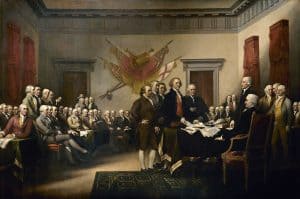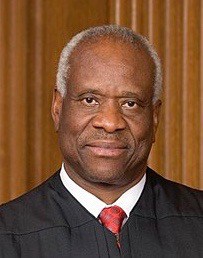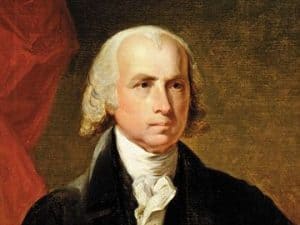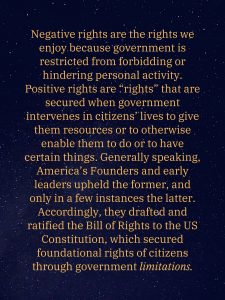A wise and frugal government, which shall leave men free to regulate their own pursuits of industry and improvement, and shall not take from the mouth of labor the bread it has earned — this is the sum of good government.
— Thomas Jefferson, First Inaugural Address, 1801 —
Unless something changes, I do not believe we can expect the Supreme Court to uphold the Constitution. Of course, we must never stop trying to convince the court to do so. Our efforts must be multi-faceted. We must work at both government and grassroots levels. Ultimately, it is We The People who can and will return our country to its foundational principles. I don’t know everything we need to do, but I do know some things.…We need to educate ourselves and others about rights. We need to be able to explain to people why the constitutional rights of Barronelle Stutzman have been violated, and why the rights of homosexuals who are demanding that she serve them have not.
— “Completely Arbitrary: The Supreme Court of the United States Is a Rogue Court, Part 2,” a Word Foundations article —
Who will govern the governors? There is only one force in the nation that can be depended upon to keep the government pure and the governors honest, and that is the people themselves. They alone, if well informed, are capable of preventing the corruption of power, and of restoring the nation to its rightful course if it should go astray. They alone are the safest depository of the ultimate powers of government.
—Thomas Jefferson—
Key point: To protect and preserve constitutional rights in America and the liberties associated with them, concerned citizens — especially Christians — must learn about the nature of authentic, unalienable rights and contend for those rights forcefully and confidently in the public square.
For more than seven years, the local newspaper in Richland, Washington—the Tri-City Herald1—has been naming local patrons’ choices for the best local shops in various categories. For four of those years, including 2019, Barronelle Stutzman’s shop, Arlene’s Flowers and Gifts, has been named the shop where the Best Florist can be found.
 Don Douglass and his mother, Arlene, first opened Arlene’s in 1977. Barronelle’s mother purchased the shop from them, and later, Barronelle bought it from her mother. Thus, Barronelle Stutzman has been a florist — and a popular and well-respected one — for a very long time.
Don Douglass and his mother, Arlene, first opened Arlene’s in 1977. Barronelle’s mother purchased the shop from them, and later, Barronelle bought it from her mother. Thus, Barronelle Stutzman has been a florist — and a popular and well-respected one — for a very long time.
Rob Ingersoll had been a friend to Barronelle and a steady customer at Arlene’s Flowers for over nine years. Never once had his sexual orientation been an issue in their friendship. Then same-sex marriage became legal in Washington State. Rob was planning to “marry” his partner, Curt Freed, and he asked Barronelle to supply and arrange flowers for the ceremony.
Despite their longstanding friendship, Barronelle felt she had no choice but to decline. Because her relationship with Jesus Christ is her most precious possession, Barronelle could not dishonor Him. She politely turned down Rob’s request, and he said he understood. Barronelle then recommended three other florists she knew would do an excellent job for Rob and his partner. They hugged, and Rob left Barronelle’s shop.
A few weeks later, Barronelle received a letter from the attorney general of Washington State. She was being sued for declining to do floral work for a same-sex wedding. That was in 2013. Barronelle and her family have risked everything to remain faithful to their religious convictions. On July 2, 2021, the Supreme Court of the United States declined to hear Barronelle’s case. This left in place a ruling by the Washington State Supreme Court against Barronelle. She and her family stand to lose everything in penalties, fines, and her opponents’ legal fees. Some will contend that justice has been served, but has it?
Whose constitutional rights have been violated?
I have a question for you, dear reader. Whose constitutional rights have been violated? Barronelle hates no one. She has served gay people, and she also has hired them to work in her shop. But she has not acquiesced to the state’s demand that she work at same-sex weddings. Why? Because of her deeply held religious convictions about what marriage is and what it means.
Barronelle is going to pay a heavy price for being true to her faith. Rob Ingersoll and his partner chose to “marry,” and in the eyes of the state of their residence were able to do so. They doubtless had no difficulty finding a florist who gladly provided and arranged flowers for their their ceremony. Yet the underlying claim (whether directly stated or merely implied) is that Barronelle’s actions and inactions somehow have caused them harm. In the eyes of the state, Barronelle therefore must be coerced: Comply with the our demands, or else!
If you were asked to explain whose constitutional rights were violated and whose were not, what would you say? I offer the following seven specific items for your consideration.
Item One: The Nature of Rights
Constitutional rights are freedoms to which people are naturally and inherently entitled, not “privileges” granted or arranged by the government. The Founders explained this in the Declaration of Independence. They wrote,
We hold these truths to be self-evident, that all men are created equal, that they are endowed by their Creator with certain unalienable Rights, that among these are Life, Liberty and the pursuit of Happiness. — That to secure these rights, Governments are instituted among Men, deriving their just powers from the consent of the governed….

Thus, natural or unalienable rights are God-given, and it is government’s job to recognize them and protect them. Accordingly, the Bill of Rights, the first ten amendments to the US Constitution,2 are limitations on government, not provisions that stipulate the state must provide something or act in some way to make a benefit or benefits possible. One exception in the Bill of Rights is that the Sixth Amendment guarantees an accused individual a trial by jury. Of course, juries must be created through a process that involves both government and the nation’s citizens.
Rights that are exercised when government and other individuals and entities stay out of a person’s way — rights the Declaration calls “unalienable Rights” —also are called negative rights, because the key to being able to exercise them is being unhindered. Freedom of speech, freedom of assembly, freedom of the press, and “Life, Liberty and the pursuit of Happiness.” are negative rights. On the other hand, rights that can only be realized when outside arrangements are made to create them are called positive rights. We can summarize these different types of rights this way.
Negative rights are the rights we enjoy because government is restricted from forbidding or hindering personal activity. Positive rights are “rights” that are secured when government intervenes in citizens’ lives to give them resources or to otherwise enable them to do or to have certain things. Generally speaking, America’s Founders and early leaders upheld the former, and in only a few instances the latter (such as an individual’s right to a trial by jury). Accordingly, they drafted and ratified the Bill of Rights to the US Constitution, which secured foundational rights of citizens through government limitations.
Dr. Aeon Skoble is a professor of philosophy at Bridgwater State University in Bridgewater, Massachusetts. In this excellent video, Dr Skoble gives an introduction to both positive and negative rights.

With this basic information as a backdrop, consider these realities about same-sex marriage, a “right” created by the Supreme Court of the United States on June 26, 2015 and implemented nationwide. The case was called Obergefell vs. Hodges, and it was decided 5-4. Justice Clarance Thomas’s brilliant dissent (excerpts are provided here) emphasized many important points, including these:
-
-
- A “right” to same-sex “marriage” is unnatural and outside the realm of rights the Founders of America recognized. (Notice Thomas’s point here is that a right to same-sex marriage is unnatural. It is not God-given, inherent, unalienable, or readily recognizable as a right.)
- Second, those demanding recognition of same-sex relationships as marriage never had any of their inherent rights violated. They demand a “correction” where no true harm has been imposed on them.
- Granting a right to same-sex “marriage” sets the stage for the natural, inherent rights of others to be thoroughly disregarded.
-
Each of these items is considered and discussed in this Word Foundations article.
Item Two: Homosexuality Is not an Inherent Quality Like Skin Color
Laws and policies that punish discrimination have traditionally been enacted to protect the vulnerable, those who in times past were not served or accommodated because of some inherent, external trait such as skin color and prejudice, the practice of prejudging an individual based on one or more external traits. One’s refraining from serving at a same-sex wedding, however, is very different from the discrimination blacks experienced during the pre-civil-rights era.

Even if a person argues that homosexuals are “born that way,” (an idea for which no scientific evidence exists), it is undeniable that homosexuality is linked inseparably to behavior. This cannot be said about skin color, ethnicity, or biological sex. Thus, behavior, and behavior that to many clearly is immoral, is tied inseparably to homosexuality and same-sex marriage.
At this point I am not asking people who believe homosexuality is morally OK to change their minds. Rather, I’m asking them to recognize that many other people disagree with them and have a right to believe as they do. Keep in mind also that those who believe homosexuality is morally wrong are not charting new territory; they are adhering to beliefs held by many civilized nations through the centuries. At the very least, those who hold a traditional view of marriage should not be punished for doing so. Those who have demanded the “right” to marry a member of the same sex should allow for traffic on the “freeway of public opinion” to travel both ways. After all, these same people contended for a two-way street before homosexuality gained acceptance in the popular culture. “You’re trying to force your morality down our throats!” they said. Now who is trying to force their morality on whom?
Item Three: The Services Sought Are Easily Acquired3
When a florist, cake artist, wedding venue operator, or another professional in the wedding services industry turns down an opportunity to work at a same-sex wedding, the couple has no trouble finding others who will gladly welcome their business. Thus, no one’s “right” to any or all of these services is being denied. Laws and policies that require an individual to celebrate a same-sex union against his or her will don’t protect the vulnerable. How are advocates of same-sex marriage vulnerable if they easily can secure the services they want?
Laws and policies that require an individual to celebrate a same-sex union against his or her will don’t protect the vulnerable. They seek to coerce people unnecessarily.
Item Four: Declining to Work at a Same-Sex “Wedding” Isn’t About Homosexuals as People, but About the Nature and Meaning of Marriage
Generally speaking, bakers and others aren’t refusing to sell their goods or services to homosexuals; they simply don’t want to be forced to participate in a ceremony that violates their deeply held views on marriage. As we said in a previous post,
Marriage is not just a relationship recognized by the state; it’s also one that, first and foremost, was established and ordained by God.
-
-
-
-
- Christianity recognizes marriage and family as the most basic unit of society.
- It also sees marriage as a picture Christ and His church, and therefore
- as a picture of the gospel.
- Further, the Christian faith sees the unity and diversity within man-woman marriage as reflective of the unity and diversity existing within the triune Godhead, the Trinity. It is amazing that the mantra of LGBTQ activists is diversity; yet same-sex marriage defies it. Heterosexual marriage is about genuine diversity.
-
-
-
An individual or government does not have to agree with this perspective on marriage to respect those who do.
Item Five: Laws and Policies that Punish Those Who Decline to Serve at Same-Sex “Weddings” Are not About Equality
Rather than leveling the playing field, laws that force participation in same-sex ceremonies give the proponents of same-sex “marriage” a legal wedge to coerce those with whom they disagree to celebrate with them. Therefore, under such laws, Christian merchants easily can be targeted and punished for their beliefs. Are we really ready to effectively give any individual or a group the “right” to make another person celebrate an event with which he or she disagrees, or an event the person simply prefers not to celebrate? No, this isn’t equality. Not by a long shot! Furthermore, there are numerous additional ways in which the concept of equality does not apply. (See Myth #13 in this article).
Whatever happened to the provision that “Congress shall make no law respecting an establishment of religion, or prohibiting the free exercise thereof”? This actually is much more than a provision; it is a part of the First Amendment to the Constitution, the “supreme Law of the Land.” The reason the First Amendment states that “Congress shall make no law…” is because Congress is the lawmaking body of government. Courts have no authority to make law — none. Yet they effectively have been doing so for many decades.
Item Six: Laws That Force Participation in Same-Sex “Weddings” Do not Limit Government, but Empower it to Act Unconstitutionally, with Partiality and Prejudice Against Those Who Hold Moral Convictions
This principle is tied closely to item one. Anti-discrimination policies that penalize those who wish not to participate in same-sex ceremonies represent the antithesis of the philosophy of rights reflected in the first ten amendments of the Constitution—the Bill of Rights. The Bill of Rights places limitations on government, because the state’s job is to stay out of citizens’ way as they exercise their God-given, unalienable rights. Policies and laws that punish those who refrain from celebrating same-sex unions empower government rather than limit it, and they embolden government to force compliance on the side of an issue that stands contrary to morality, ethics, and the teachings of nature and of many religious faiths.
Item Seven: The Unalienable Rights Upheld in America’s Founding Documents Include Conscience Rights
To the Founders, rights of conscience were God-given and inherent. The Declaration of Independence and the US Constitution affirm these rights. Consider:

Founding Father James Madison is known as the Father of the Constitution. He declared,
Government is instituted to protect property of every sort…. This being the end of government, that alone is a just government which impartially secures to every man whatever is his own.
In the same document, Madison added,
Conscience is the most sacred of all property; other property depending in part on positive law, the exercise of that, being a natural and unalienable right. To guard a man’s house as his castle, to pay public and enforce private debts with the most exact faith, can give no title to invade a man’s conscience which is more sacred than his castle, or to withhold from it that debt of protection, for which the public faith is pledged, by the very nature and original conditions of the social pact.
Madison essentially said, “Woe to any government that would protect the right of an individual to own a home and other tangible items, yet not protect his right to live his life according to his own conscience, his most important and sacred possession.”
 I invite everyone to listen carefully the May 17, 2016 broadcast of WallBuilders Live! The content of the program is discussed in this article. Make no mistake. The Founders of America believed conscience rights were sacred. Government’s duty was to protect them — never to trash them.
I invite everyone to listen carefully the May 17, 2016 broadcast of WallBuilders Live! The content of the program is discussed in this article. Make no mistake. The Founders of America believed conscience rights were sacred. Government’s duty was to protect them — never to trash them.
The Bottom Line
So, could you now make the case that Barronelle Stutzman’s rights have been violated, and that Rob Ingersoll’s and Curt Freed’s have not? I hope this has been helpful.
In conclusion, I would suggest that regardless of whether or not one favors or opposes same-sex “marriage,” everyone should be gravely concerned about the unmitigated efforts on the part of Washington State, not to prevent a citizen from expressing a particular view, but instead to coerce her to express a view with which she strongly disagrees. And all the while, the Supreme Court of the United States is looking on after having effectively given its authorization and consent.
This does not bode well for any American’s constitutional rights. As we said in a previous post, it is “Time to Take a Stand.”
I am trying to do just that. Will you join me?
Copyright © 2021 by B. Nathaniel Sullivan. All rights reserved.
Notes:
1The Tri-Cities area consists of “three closely tied cities—Kennewick, Pasco, and Richland.”
2The Bill of Rights was ratified on December 15, 1791, on the heels of the Constitution’s being ratified on June 21, 1788.
3Items three through six originally appeared in the Word Foundations article “Misinformed and Misled, Part 2.”




Be First to Comment